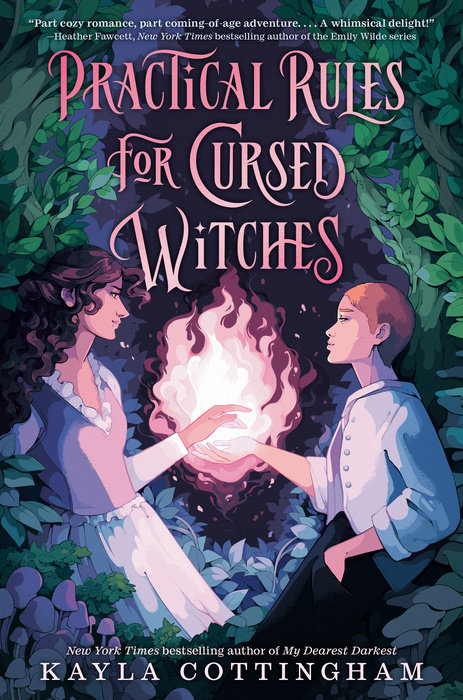Practical Rules for Cursed Witches
Author Kayla Cottingham
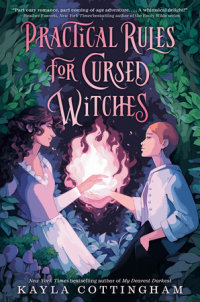
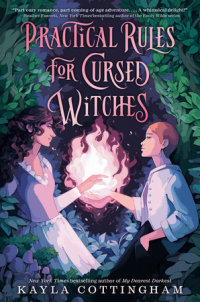
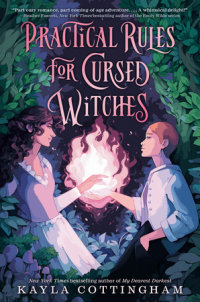
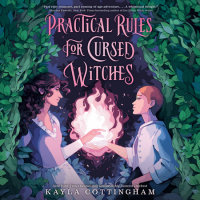
Practical Rules for Cursed Witches
From the New York Times bestselling author of My Dearest Darkest comes a cozy fantasy romance about a teen witch who must complete her magical training by breaking a powerful family’s curse. But her own affliction—to never find true love—gets in the way when she falls for the girl she’s trying to save.
Magic is in Delilah Bea’s blood. Her absentee father is the world’s most famous cursebreaker, while all the women in her family are…
From the New York Times bestselling author of My Dearest Darkest comes a cozy fantasy romance about a teen witch who must complete her magical training by breaking a powerful family’s curse. But her own affliction—to never find true love—gets in the way when she falls for the girl she’s trying to save.
Magic is in Delilah Bea’s blood. Her absentee father is the world’s most famous cursebreaker, while all the women in her family are fated to never find true love. So when Delilah sets out to complete her magical Calling and gain her full powers as a witch, she has the perfect task in mind—breaking the Bea family curse.
But Delilah’s Calling is hijacked by Kieran Pelumbra, the spoiled son of the most powerful family in the country, and breaking his curse suddenly becomes her official assignment. Every generation, a pair of Pelumbra twins is doomed, with one twin draining the other of their life and magic. Kieran grows weaker while his sister, Briar, becomes…something monstrous.
As Delilah and the twins set out on their quest, they quickly realize that breaking the Pelumbra curse isn’t going to be simple. For one thing, the rest of the Pelumbra family doesn’t actually want their curse broken—and they’ve sent hunters after the trio to ensure they fail. For another, something about Briar gets under Delilah’s skin, distracting her and making her want to kiss the perpetually grumpy look off her face. But with time running out for the twins and Delilah’s own true love curse getting in the way, they may not stand a chance of finding their happily ever after.
An Excerpt fromPractical Rules for Cursed Witches
Chapter One
Rule #12: Even magical secrets are no match for small-town gossip.
“When you channel your magic,” Ruby Flick, the Kitfield village witch, explained, “it’s not about force. It’s allowing raw magic to flow into whatever medium you’re working with--be that packing a tea bag or performing a piece of music. Slow but sure.”
Delilah Bea, whose face was scrunched up as she drew magic from her chest and out through her fingers, exhaled and dropped her hands. She glared up at the ceiling. “I know, I just . . .”
“Lack patience?” Ruby guessed.
Delilah took on a look of melodramatic betrayal. “Me? No.”
“Check it out,” said Clarissa, Ruby’s fifteen-year-old daughter. Delilah paused in her attempt to shove tea leaves into a little gossamer bag and found that Clarissa had already tied off her own tea bag and placed it in water. As the tea steeped, curls of red from the hibiscus she’d added darkened the liquid to almost the color of blood. The steam rising from it curled into little heart shapes before fading into the air.
“Always the…
Chapter One
Rule #12: Even magical secrets are no match for small-town gossip.
“When you channel your magic,” Ruby Flick, the Kitfield village witch, explained, “it’s not about force. It’s allowing raw magic to flow into whatever medium you’re working with--be that packing a tea bag or performing a piece of music. Slow but sure.”
Delilah Bea, whose face was scrunched up as she drew magic from her chest and out through her fingers, exhaled and dropped her hands. She glared up at the ceiling. “I know, I just . . .”
“Lack patience?” Ruby guessed.
Delilah took on a look of melodramatic betrayal. “Me? No.”
“Check it out,” said Clarissa, Ruby’s fifteen-year-old daughter. Delilah paused in her attempt to shove tea leaves into a little gossamer bag and found that Clarissa had already tied off her own tea bag and placed it in water. As the tea steeped, curls of red from the hibiscus she’d added darkened the liquid to almost the color of blood. The steam rising from it curled into little heart shapes before fading into the air.
“Always the theatrics with you,” Delilah said, chuckling. She’d known Clarissa most of her life. While they were friends, their two-year age gap had always made Delilah view her more as a little sibling than a peer.
“Let’s test it,” Ruby said. She reached for her daughter’s teacup and took a careful sip. She paused, tasting. “You were going for a spell that mimics the feeling of romantic love?”
Clarissa nodded, eyes bright. She looked exactly like her mother, save the crow’s-feet and smile lines. They shared the same long blond hair and green eyes, and the faint smell of rosemary Clarissa gave off when she practiced her magic was almost identical to her mother’s trademark scent.
Ruby inhaled, closed her eyes, then exhaled. “This is closer to upliftment. But”--she pushed the cup back toward her daughter--“still lovely work.”
Clarissa’s face fell a bit. Delilah quickly said, “Hey, don’t worry about it. It’s hard to channel an emotion-based spell if you’ve never felt the thing you’re trying to channel.”
Clarissa’s cheeks reddened. “I know what romantic love feels like.”
Delilah and Ruby both raised their eyebrows and said, “Oh?”
Clarissa’s eyes widened, and her blush only grew.
Delilah bit back a smile. Puppy love--how cute. “And who exactly are you in love with? Don’t tell me it’s Annamarie’s daughter--she may have great arms from kneading dough at the bakery, but she always smells like yeast.”
“I shouldn’t have said anything,” Clarissa muttered.
Before Delilah could press her more, a knock sounded on the door.
A voice called, “Hello? It’s Charlotte.” The door pushed open the next moment, the little bell attached to it jingling.
Delilah’s mother stuck her head in. “Am I early?”
“No, we were just wrapping up,” Ruby said, collecting the piles of different leaves and buds the three witches had been using to concoct spelled teas. “Come on in.”
Charlotte Bea stepped inside. She wore her slightly graying sandy hair up in a bun with a few pieces loose. The gray eyes she shared with Delilah were hidden behind round glasses that she’d only started needing in the last couple years. She tucked her hands into the pockets of her loose canvas pants--the ones she usually wore for her shifts at the clinic--and leaned against the wall with a small smile.
Ruby lived in a cottage at the edge of the woods outside Kitfield. For generations, it had been the home of the village witch, whose title had been passed down from parent to child, just as Ruby would pass it to Clarissa someday. Thorny vines and twining flowers cloaked the old bungalow in a blanket of green and pink and white as soon as spring came. At the moment, just the four women were inside; but often on days like this, multiple townsfolk would have crossed the lake that divided the cottage from the edge of town to ask Ruby for custom spelled teas and brews.
Delilah began packing her things into her shoulder bag and told Clarissa, “You know, if you’re looking for a chance to ask someone out, you could always do it at my birthday party this evening. I’ll be your wingwoman.”
Clarissa muttered something under her breath that Delilah couldn’t hear and punctuated it with a sigh.
“This is a bit bittersweet,” Ruby said as Delilah rose out of her chair and shouldered her bag of magic tools--chalk for drawing runes, a wooden spoon for spelled baking, herbs and ingredients for teas or simmer pots, and parchment for notes.
“Last magic lesson before you leave on your Calling,” Charlotte agreed, smile not quite meeting her eyes.
“I’m going to miss our lessons together,” Clarissa added. “You’ll have to send me plenty of letters about your Calling so I know what to expect when I go on mine.”
Ruby asked, “How do you feel about it, Delilah?”
“Honestly? Overwhelmed,” Delilah said, rubbing the back of her neck. “I’m trying to think more about this evening and less about the fact that the Council is about to show up. You’re both coming tonight, right?”
Ruby nodded. “It would be wrong to send you out into the world without a proper goodbye.” She came to Delilah’s side and took her hand, holding it between her palms. “You’re going to do great things out there, Delilah. So long as you’re patient with yourself.”
Delilah sputtered a laugh. “Because I’m famously good at that.” She shook her head. “But thank you. I appreciate it.”
The mothers and daughters quickly said their goodbyes. Delilah and Charlotte headed out the door to where the lake lapped at the shore not far from the Flicks’ cottage. Charlotte had pulled their canoe onto the grass. She sat in the front while Delilah pushed them off from the back, then jumped in, her collection of magic-casting objects clanging around in her shoulder bag.
“If I were the village witch,” Delilah said as she gave the canoe one final push away from the shore with her oar, “I’d build a road.”
“But think of how much mother-daughter bonding time we’d miss if we didn’t do this,” Charlotte said with a laugh.
“We could bond in a car,” Delilah pointed out.
“Cars,” Charlotte spat. She shook her head, blond hair springing loose from her bun. Delilah had inherited very few of her mother’s features, a fact that made her increasingly bitter with every passing year. Her mother was small and slim with the face of a pixie, whereas Delilah had inherited her father’s height, thick frame, dark, curly hair, and obtrusively large nose. Every time she saw him grinning at her from the front page of the newspaper, she silently cursed his weirdly strong genetics.
“We don’t need that kind of thing,” Charlotte added. “No point.”
“But a car would mean we could leave Kitfield,” Delilah pointed out. “We could go anywhere! Maybe as far as Gellingham--you could finally take those medical classes at the university we always hear about on the radio. Get a legitimate medical license so you could practice in the city.”
After a brief pause, Charlotte mused, “Your father’s in Gellingham.”
Silence overtook them. The sounds of the oars parting the water and the crows shrieking in the pine trees that surrounded Silverside Lake weren’t enough to drown out the rush of thoughts that echoed in Delilah’s head.
Before she could start off on her usual tangent about how much she hated her father, her mother said, “I’m sorry, again, that you’ve never been able to meet him. That he never got to teach you magic.” Her eyes dropped, mouth curving into a small frown. Her rowing became weaker. “I’m sorry I could never teach you magic.”
Delilah stopped rowing, and her fist tightened around the top of the oar. They were in the middle of the lake now, a breeze lightly dimpling the glittering water. Her mother stared forward over the bow of the boat, hiding her face.
“That’s not your fault,” Delilah reminded her. “He’s the one with the gall to totally ignore my existence for all these years.”
“I just . . .” Charlotte exhaled. “If I were a witch, I wouldn’t have to ask Ruby to teach you. It feels like having to ask someone else to give my child the birds-and-bees talk.”
Delilah choked on a laugh. “Mom, it’s not like that at all--”
“I’m serious,” Charlotte said. She shook her head. “I know she’s taking a risk teaching you. I know that in a town like Kitfield, having another witch could put Clarissa’s future in jeopardy. But I still asked her, despite that, to teach you. And now if you want to practice magic, you’ll have to leave.”
Silence overtook them again. The birds sang and the water lapped at the side of the canoe.
It was true, but they’d never acknowledged it out loud. Since Clarissa was considered Ruby’s official apprentice, Delilah would never be Kitfield’s witch. Not unless the public’s opinion of witches--tainted by years of unrestricted witchcraft and inter-coven conflict that had resulted in its fair share of collateral damage--improved and groups of witches stopped making them ill at ease. Or if Delilah challenged Clarissa to an old-fashioned magical duel and beat her, effectively evicting her from the town. While it was entirely possible she could beat the younger witch, it would be a massive betrayal of trust to both Ruby and Clarissa. They’d made the unspoken promise long ago that once Delilah’s training was over, she’d either become the village witch of another town or stay in Kitfield and not practice.
Or go to the big city. There the public attitude toward witches was more trusting, and casual magic and enchantments were considered the norm. There any witch with a license could practice magic for money.
Delilah bit her lip. “I . . . could always stay here. And try something else. Maybe get a job at the Sunflower Bakery and make normal pastries.”
Her mother didn’t hesitate before she said, “You’d never be happy doing that.”
Again, she was right. Magic was Delilah’s passion. It always had been, from the time she was a toddler inadvertently casting joy spells through her crayon drawings. She loved being a witch.
But she also loved her mother and Kitfield. And recently it had become more and more apparent that she couldn’t have both.
“I feel terrible leaving,” Delilah said. “Not just because I’ll miss you, but because of our . . .”
She didn’t finish the sentence. She didn’t need to. What she was referring to was something all the Bea women, for generations and generations, had lingering in the back of their minds all the time. That hollow feeling every time someone shot them a smile or casually touched their arm during a conversation.
Every time someone like Clarissa mentioned falling in love.
Charlotte was silent. She gripped her oar and dipped it into the water, exhaling through her nose. “Let’s save this conversation for another time, hmm? It’s your birthday, after all.” She looked over her shoulder and offered her daughter a watery smile. “We can worry about the future another day.”
Delilah hesitated, but said, “Yeah. All right.” She jutted her chin toward the basket in the center of the canoe. “You think we should make a dark chocolate torte to go with the raspberries you picked?”
Joy sparked in Charlotte’s eyes. “Oh, absolutely.”
They rowed the canoe the rest of the way across the lake, turning off onto a lily pad–speckled waterway. They beached the canoe on the grass and dragged it onto the shore together--Delilah doing most of the lifting, as she was a fair amount bigger and stronger than her mother.
“I’ll put this away,” Delilah called to her mother. “Would you mind preheating the oven for me in the meantime?”
Charlotte took the basket and nodded. The edge of the lake was about forty feet from the small cottage the two of them shared. Ivy encased it, trimmed back only at the windows and doors. The open shutters were painted light blue with little yellow flower details Delilah had added when she was younger. Facing the outer ring of Kitfield, the street beyond it recently becoming more filled with cars than ever before, the cottage felt like a barrier between the small-town bustle and the magic on the other side of the lake.
“See you inside!” Charlotte called.
Delilah waved to her, then grabbed the canoe’s pull rope, dragging it toward the shed--careful to avoid flattening her mother’s flower garden. She made it just a few steps before the wind suddenly changed.
A smell hit her. Within seconds she was gagging, covering her mouth and nose with her hand.
It was like nothing she’d ever smelled before: a bizarre mix of decaying flesh, peat, and earthy rot. Her eyes watered. She forced herself to push the canoe into the shed before closing the doors and using both hands to block her nose and mouth. After a second, she recognized the scent.
A curse, and a deadly one at that.
She cast a quick look around, at the edge of the lake where the lily pads floated lazily, the yard dotted with flowers, the woods--
For the briefest second, Delilah saw a flash of movement. She turned in time to see a figure vanish into the trees.
As it disappeared, the stench began to fade.
Delilah, shoulders tensed and nostrils flaring, backed her way to the cottage door and slipped inside.
“Everything okay?” her mother asked as Delilah came into the kitchen.
She absently touched her nose. “Yeah. It’s . . . nothing, I’m sure.”
Something told her that wasn’t true.
That night, after Delilah had baked a lovely torte, changed into a long, belted skirt, and tucked a button-down shirt into it, she left with her mother for the Landsmeet Pub. Just off Kitfield’s central square, the pub boasted rooms for travelers on the upper level and a bar down below. It was a stone structure, but the windows and doors were made of hawthorn wood--a holdover from the old days, when people feared witches enough to decorate their homes with one of the few materials that could block their magic. Most of the houses in Kitfield had it built into them somehow. Delilah remembered what a massive pain it had been for Charlotte to tear out the hawthorn parts of their cottage when Delilah was little so she could practice her magic at home.
The pub’s windows revealed people already at tables, swigging beer and laughing. Golden ale sloshed to the floor in bubbling clusters like sea foam. A wall of sound hit Delilah as she opened the doors, everyone inside shouting her name and wishing her a happy birthday.
A smile crept across Delilah’s face. The pub was packed with family friends and people from school--an uncommon sight for the Landsmeet, which mostly catered to travelers. Most people were drinking merrily while others danced to the music from the band playing in the corner. The bar was decorated with summer blooms; the walls featured images of Kitfield locals over the years, including pictures of Charlotte as a child with her mother and grandmother. A few mounted deer heads had been fitted with flower crowns for the occasion, and green swaths of fabric hung in waves from the ceiling.
